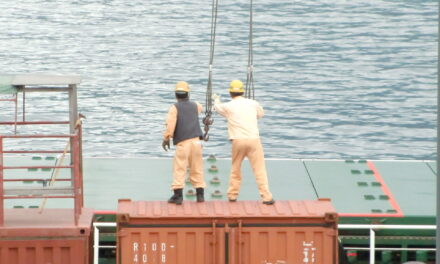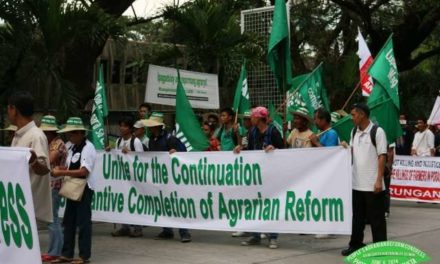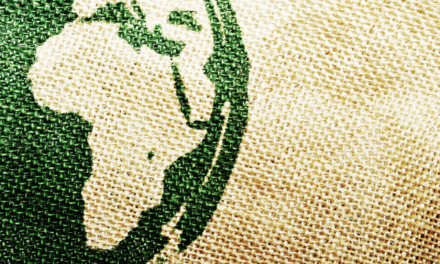Mary Ann Manahan
15 March 2012
Speech delivered during the implementation of the right to water and sanitation transversal session of the Alternative World Water Forum/Forum Alternatif Mondial d’Eau. The session was moderated by Sylvie Paquerot, University of Ottawa and the panelists include Maude Barlow, Council of Canadians; Arthur Manuel, Defenders of the Land; Pedro Arrojo, Water for New Culture/University of Zaragosa; and Alexandros Kastrinakis, Initiative 136 in Greece.
It is an honor to be among comrades and kindred spirits from around the world, not only sharing the same cause of challenging the corporate World Water Forum, but also presenting a new vision, a new culture of water as part of our collective aspiration, to build the future that we want. I would also like to give a big hand to all the young people like me who are participating in this politically strategic gathering.
Many of you know Asia as an “economic miracle”— a region which managed to evade the financial crises in Europe and the US. Led by China and India, Asia is being touted as the new engine of the global economic system, fulfilling the dual roles of producer and consumer. Little is understood about how these developments are seen and experienced “from below” or what it means for the environment, in China, India, and across the region. In reality, this economic growth does not necessarily translate to better jobs, or even poverty reduction. In fact, the number of Asians living in extreme poverty has not changed in three decades – they number 1.1 billion in 2008 as they did in 1981!
As per official MDG reports, Asia has already surpassed its targets, with an average achievement of 88% coverage in the provision of clean drinking water. What is not seen are the rural-urban disparities; and the gender, caste, ethnicity, race and class divides that characterize the region.
Asian movements face four major challenges in their struggle for the right to water and sanitation.
First, while there are 27 Asian governments that adopted the UN Resolution on the right to water and sanitation, concretizing this in terms of policy, action plans and actual programs is a problem. At present, only a few Asian governments seriously implement the human right to water and sanitation. Common across the region is governments’ misguided belief on the market—making it the arbiter of all value including rights of people, handing over the public services such as water to the corporate private sector, and yielding to IFIs such as the Asian Development Bank and World Bank on their conditionalities on water service provision and resource management. Such a belief has made us, Asian people, guinea pigs and laboratories of privatization experiments and structural adjustment programs for three decades. Unfortunately, and as feared, many of these experiments failed. The privatization of the water utilities in Metro Manila and Jakarta resulted in: skyrocketing prices, inefficient services, unequal access to water and sanitation between the poor and the rich, and the total lack of transparency and accountability in the operation of the water systems. In turn, these gave rise to campaigns to reverse privatization and to reclaim public water through community-owned water systems and improving the public sector. Indonesian civil society, for instance, seek to remunicipalize Jakarta’s water system. Clearly, these experiences show that we cannot allow governments to renege on their commitment, or to just hand over the responsibility of providing water to the private sector.
Second, Asia’s diverse and complex social, economic and political contexts make it either difficult or easy in terms of how the right to water and sanitation can be implemented through alternative ideas and how these are given spaces, even as private capital and corporations dominate much of the peoples’ lives in the region. While alternatives to commercialization and privatization, abound, there lacks the adequate institutional and policy support for such to flourish. Alternatives such as Public-Public Partnerships, innovative models of water service provision, upstream-downstream watershed protection, among others offer new paths and options for Asia’s waterless population, highlighting necessity and urgency of a “vote for public and community” based on our own notions of what a good public management should be. These need to be the norm rather than the exception.
Finally, in the context of the multiple crises that we all face today and the Rio+20 debates, there is the challenge of expanding and linking the right to water and sanitation to other rights—the right to adequate food, food sovereignty, livelihood, right to land, and ultimately, to life itself. We cannot separate one from the other. Our enemies are already making the links of food-water-energy based on their own vested interests and belief in the financialization not only of water but also nature. This is why when we talk about implementing the right to water, we need to understand the other threats to these right such as land and water grabbing, the destruction of our forests, the building of hydropower, mining, and extractive activities, and mega infrastructure, among others that are affecting the quality and availability of water. Another dimension is that climate change will further exacerbate already existing geopolitical conflicts, especially in countries that share waters, and problems as water is being used as a political tool for occupation.
This is what’s happening in conflict areas such as Palestine where Israel is depriving Palestinians of use of water through the wells to drive them off their lands. Here, the struggle for the right to water becomes intertwined with their struggle for self-determination and liberation.
Finally, I would like to end with some ideas on collectively moving forward:
One, we need to demand and challenge not only Asian governments but as well the regional blocs such as ASEAN and SAARC, to be bold and voice out their support for human right to water. As duty bearers they must work for the protection and fulfillment of the right to water, including the promotion and support for alternatives to commercialization and privatization, and community stewardship. Their adoption of the Ministerial Declaration of the official World Water Forum, which is backpedalling on this right, is not only disconcerting, it’s an outright abdication of their roles and responsibilities to the people.
Two, we have to work together to have Asian governments say no to the IFIs conditionalities and drive for privatization and commercialization of water, particularly, through free trade agreements and to put a stop to risky dam constructions, land grabbing, mining and extractive industries.
Three, we need to collectively create dynamic governance spaces for alternatives to develop and flourish. The alternatives I have mentioned offers not only inspiring stories but new ways to conceive public water management and governance that is underpinned by principles of water justice, water as a commons, and allocating, framing, protecting and realizing rights in an equitable, and sustainable way, as long as those who are historically marginalized, the indigenous peoples, and poor are part of the decision making process at all levels. These positive models and practices have to be supported and strengthened by state and public investments rather than outright support to privatization.
Finally, we need to remain steadfast and vigilant amid the real threat of water being regarded as a commodity and natural capital that can be traded and sold in the markets. While climate proves to be a constraint, what is for sure is our effort to collectively build our climate justice consciousness and respond to these challenges. Water, which is the lifeblood of our world, becomes a new frontier for cooperation, in which peoples’ regional and global solidarity can be fostered. Now more than ever, we have to challenge the dominant market-driven model of water management and governance which has failed for the last 20 years.
Given our collective experience, determination, and the broad solidarity that we have with the water justice movement, the indigenous peoples movement, the peasant movements, and climate justice movement, I am confident that we will be able to meet these challenges and achieve the right to water and sanitation for all.
Thank you very much!









